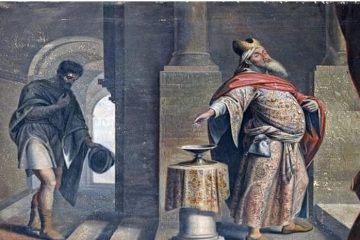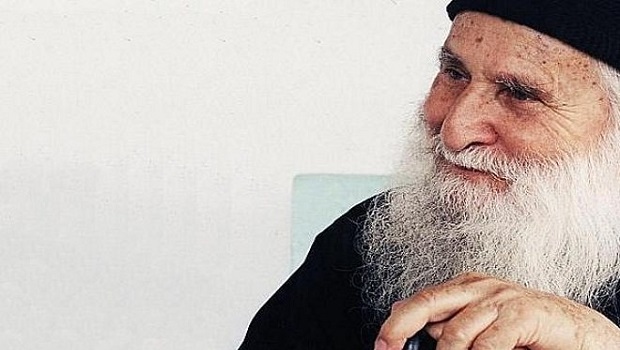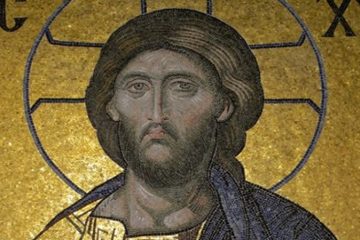Eleftherios Balakos
“I shall be with you till the end of the world” (Matth. 28, 20).
With these words, Christ bids farewell to His disciples at the Ascension, on the Mount of Olives. His last act is a departure and, at the same time, a pledge. This seems to be something of a contradiction, but is not, in fact, so. Christ was no longer present in the manner that the Apostles had known until then, but He promised that He would not leave them orphaned and abandoned.
“And behold, I send the promise of my Father upon you; but stay in the city, until you are clothed with the power from on high” (Lk. 24, 49).
The promise was fulfilled. On the fiftieth [in Greek “pentikosti”] day after the Resurrection of Christ, the promise came true in Jerusalem, where the disciples were gathered in one mind and were awaiting the fulfilment of the pledge. The Holy Spirit descended on the disciples, the Comforter: “He will glorify me, for He will take what is mine and declare it to you. All that the Father has is mine; therefore I said that He will take what is mine and declare it to you” (Jn. 16, 14-15).
From that time until today, and, indeed, for all time, the Holy Spirit has remained in the Church: by guiding the believers in Christ, in the true faith and life and, at the same time, by making Him continuously present in the Eucharist Assembly of the faithful and, by extension, in the everyday life of all the members of the Church.
You’ll say: “What has all this got to do with the title of the article? We know all about Pentecost. Same old thing”. Allow me to share a few thoughts with you. The Church always experiences all of the works of Divine Providence in every one of its Eucharistic Assemblies. Shortly before the offering of the bloodless sacrifice, the celebrant says, on behalf of the congregation: “Remembering His message of salvation and all else He did and suffered for us, recalling particularly His death on the cross, the burial, resurrection in three days, ascension into heaven, establishment at Your right hand and also His glorious second coming”.
The Church always lives all the events of Divine Dispensation in a particular way, enabling the faithful to celebrate them in a tangible and special way. Every feast is, in essence, a way of confirming the event, because, to put it simply, what is required is that it should have meaning for all the faithful and fill their daily lives.
I’ve written the above on the occasion of the Feast of Pentecost. Even though the hymns of the Church call it the “last feast” in the sense of a recapitulation and fulfilment of the redemptive task of the Triune God, it is at the same time, and in essence, the first feast, the beginning of a new reality in human history. It’s the starting-point for a new way of life and an invitation to follow it.
Believers in every age have the opportunity to claim for themselves in their own lives Christ’s promise that “I will be with you always, to the end of the world”.
The thing is, do we simply hear this potential that’s given to us? Do we hear it and then carry on? Do we hear it, get all excited over it and then slowly forget our decisions to live it out here and now?
The bottom line is that Christ is the God of the Cross and of the Resurrection. Are our faith and religious sensibilities restricted to the zeal and enthusiasm of Great Week or, in the best case scenario, to a few weeks more?
Is Christ, His Gospel, the life He’s given us through His work on earth not our everyday life? Is He only for the days we’ve set aside for Him? For Sundays and feasts, at best? For the days and times we ourselves chose?
Christ entered our daily lives to give them true meaning, true life. Now, you either taste this life or you don’t. You’re either on the road or you aren’t. Christ called and continues to call each of us to take a stand as regards belief in Him.
In the ideological, social, politico-existential confusion and decline we’re enduring, the Church invites and challenges every well-disposed person to come to the true life, without strings, and to take part in the communion of souls which we call the Church. There, they will come to know, will experience the permanent presence of the Lord in the life of the Church and will realize what it means to be united with Christ and other people.
I’d like to close with the hymn that’s sung at the Presanctified Divine Liturgy, just before we go up for communion: “Taste and see that the Lord is good”, that is, beneficial, merciful.
This opportunity is given to us by the Church, which inaugurates its presence in human history and reality with the events of Pentecost. People who dare to approach the Lord taste this new life which He alone offers to all of us.
Source: pemptousia.com




0 Comments